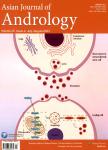Molecular signaling involving intrinsically disordered proteins in prostate cancer
Molecular signaling involving intrinsically disordered proteins in prostate cancer作者机构:Department of Pharmacy Centro Interuniversitario di Ricerca sui Peptidi Bioattivi University of Naples 'Federico II' 80134 Naples Italy
出 版 物:《Asian Journal of Andrology》 (亚洲男性学杂志(英文版))
年 卷 期:2016年第18卷第5期
页 面:673-681页
核心收录:
学科分类:0710[理学-生物学] 071010[理学-生物化学与分子生物学] 081704[工学-应用化学] 07[理学] 08[工学] 0817[工学-化学工程与技术] 09[农学] 071007[理学-遗传学] 0901[农学-作物学] 0836[工学-生物工程] 090102[农学-作物遗传育种]
主 题:inflammation intrinsically disordered proteins prostate cancer
摘 要:Investigations on cellular protein interaction networks (PINs) reveal that proteins that constitute hubs in a PIN are notably enriched in Intrinsically Disordered Proteins (IDPs) compared to proteins that constitute edges, highlighting the role of IDPs in signaling pathways. Most IDPs rapidly undergo disorder-to-order transitions upon binding to their biological targets to perform their function. Conformational dynamics enables IDPs to be versatile and to interact with a broad range of interactors under normal physiological conditions where their expression is tightly modulated. IDPs are involved in many cellular processes such as cellular signaling, transcriptional regulation, and splicing; thus, their high-specificity/low-affinity interactions play crucial roles in many human diseases including cancer. Prostate cancer (PCa) is one of the leading causes of cancer-related mortality in men worldwide. Therefore, identifying molecular mechanisms of the oncogenic signaling pathways that are involved in prostate carcinogenesis is crucial. In this review, we focus on the aspects of cellular pathways leading to PCa in which IDPs exert a Iorimary role.



